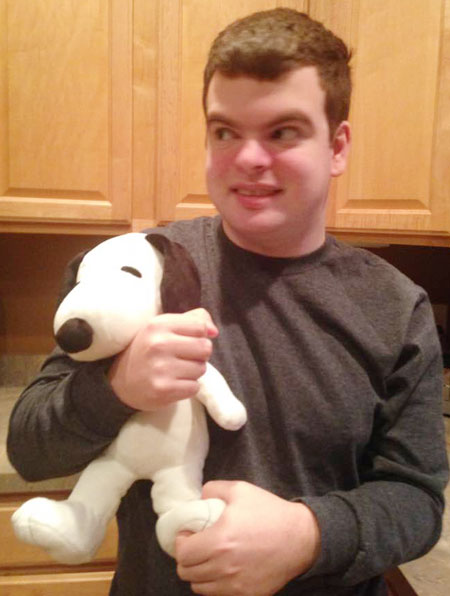Uncertain, separated, he doesn’t understand
When a woman tells Adam Sillery her birth date in 1985, he answers with the day of the week. And, he’s correct.
But, when he’s told why he must stay home from his job and community activities at Opportunity Partners’ (OP) Asplin Center, that’s harder to understand. He’s had to remain at a group home for almost two months. Staffed 24-7, he and three other men are following the governor's stay at home order.
“It’s very alienating. I don’t think he understands why he can’t do things and why he can’t see us,” said his mother. “It’s very unsettling. The next phase of this is going to be when do they go back and what’s that going to look like?”
Adam, 28 , was diagnosed with a form of autism at age four. He often repeats back what’s being said to him.
Typically, about half his time is spent at the Plymouth site doing production work and half in life enrichment programs. While Margie said he loves his group home, more options are needed.
If OP opened its doors today, Margie would send her son back, without question. She trusts they will make every effort to do things right, put safety first, and follow the guidelines. She’s looking forward to that day when he can have a more diverse life again.
Margie has worked in job placement and knows more than most about the challenges. Those who are in the regular workforce are expected to work independently and much communication is needed to keep people successful, she said.
Adam isn’t focused on getting a paycheck. On trips to Target, he would rather look at the frozen pizzas than anything else. “He doesn’t really want things.” The thinking runs in the family, which she said is not very materialistic.
A straight talker, who often speaks of common sense, Margie is from New Jersey. The family moved to Minnesota in 2011, after 20 years in the Chicago area and two in Ohio. (Margie is at center in middle photo.)
Before the shutdown, he was in Special Olympics, Project SOAR community ed and Reach for Resources services for physical and mental wellbeing. He’s not doing any of those now, said Margie.
There are phone calls and Facetime sessions with family. They drive to his place with Gracie, a 16-year old pit bull mix with 11 years in the family. They wave.
The Sillerys could have brought Adam home for a minimum of two weeks. They figured he would have better access to acute care at the group home. The mother said it will be hard for him to wear a mask all day.
For the whole population of people with disabilities, Margie said, “Really, honestly, it just stinks. It’s not a good situation and the uncertainty about going back and getting these programs, especially the day training programs, up and running again, is not good.”
The concerned mother said the situation is exposing how fragile the system is to begin with.
Others have a hard time grasping the issues her family faces. “In a perfect world, my son is never going to be able to support himself.”
She’s spoken with her Minnesota House rep in Eden Prairie to explain the situation. “It’s important to the community that we have a diverse population, both ethnically and neurotypically,” she said. “We have all kinds of people who benefit from being around people with differing abilities.”
Margie wears a mask when interacting with people for work. She washes her hands frequently. “Can we go on living in a vacuum?” she asks. “No we can’t.”
But, when he’s told why he must stay home from his job and community activities at Opportunity Partners’ (OP) Asplin Center, that’s harder to understand. He’s had to remain at a group home for almost two months. Staffed 24-7, he and three other men are following the governor's stay at home order.
“It’s very alienating. I don’t think he understands why he can’t do things and why he can’t see us,” said his mother. “It’s very unsettling. The next phase of this is going to be when do they go back and what’s that going to look like?”
No clear path to normal
As of May 11, there were no set dates for Adam to return to the day program. And, since Margie’s son works in a center, she’s fearful that this option may somehow fall victim to the changes that are coming due to virus concerns.Adam, 28 , was diagnosed with a form of autism at age four. He often repeats back what’s being said to him.
Typically, about half his time is spent at the Plymouth site doing production work and half in life enrichment programs. While Margie said he loves his group home, more options are needed.
COVID checks, precautions
His group home is part of a company that serves just under 300 people and every resident was tested for COVID-19, she explains. Adam and his housemates were virus free and only one home had a positive case. The person had underlying health issues. “They are doing a great job,” she said.If OP opened its doors today, Margie would send her son back, without question. She trusts they will make every effort to do things right, put safety first, and follow the guidelines. She’s looking forward to that day when he can have a more diverse life again.
Marginalized, job challenges persist
People with disabilities are often marginalized by society, she said. Everyone wants to keep them safe, but at the end of the day, “We have bigger problems than that.”Margie has worked in job placement and knows more than most about the challenges. Those who are in the regular workforce are expected to work independently and much communication is needed to keep people successful, she said.
Adam isn’t focused on getting a paycheck. On trips to Target, he would rather look at the frozen pizzas than anything else. “He doesn’t really want things.” The thinking runs in the family, which she said is not very materialistic.
A straight talker, who often speaks of common sense, Margie is from New Jersey. The family moved to Minnesota in 2011, after 20 years in the Chicago area and two in Ohio. (Margie is at center in middle photo.)
Engaging activity is key for Adam
Adam is easy going and likes to keep busy. He assembles fire sticks and boxes for camping, and diaper bags for Target at OP, she said. He’s fine with volunteering at Feed My Starving Children and making lunches too.Before the shutdown, he was in Special Olympics, Project SOAR community ed and Reach for Resources services for physical and mental wellbeing. He’s not doing any of those now, said Margie.
There are phone calls and Facetime sessions with family. They drive to his place with Gracie, a 16-year old pit bull mix with 11 years in the family. They wave.
The Sillerys could have brought Adam home for a minimum of two weeks. They figured he would have better access to acute care at the group home. The mother said it will be hard for him to wear a mask all day.
For the whole population of people with disabilities, Margie said, “Really, honestly, it just stinks. It’s not a good situation and the uncertainty about going back and getting these programs, especially the day training programs, up and running again, is not good.”
The concerned mother said the situation is exposing how fragile the system is to begin with.
Others have a hard time grasping the issues her family faces. “In a perfect world, my son is never going to be able to support himself.”
Families like hers have same fears as others
But in the disability community, Margie said people are worried about the future. She has lots of friends with adult children who have disabilities in the regular workforce. Are the jobs still going to be there? What’s going to happen?She’s spoken with her Minnesota House rep in Eden Prairie to explain the situation. “It’s important to the community that we have a diverse population, both ethnically and neurotypically,” she said. “We have all kinds of people who benefit from being around people with differing abilities.”
Margie wears a mask when interacting with people for work. She washes her hands frequently. “Can we go on living in a vacuum?” she asks. “No we can’t.”


